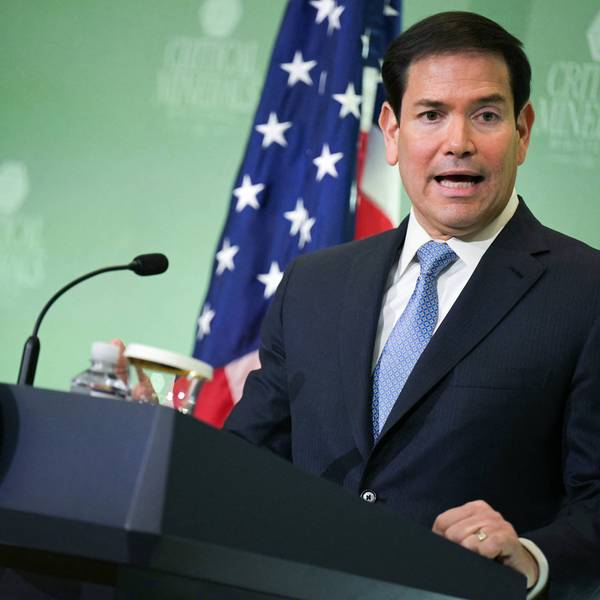The House Republican leadership on Wednesday abruptly canceled planned floor votes on mass surveillance reforms shortly after unnamed U.S. intelligence officials told multiple news outlets that Russia has made alarming progress on a space-based nuclear weapon purportedly designed to target American satellites.
The timing of the intelligence leak raised suspicions among journalists and lawmakers who support reforms to Section 702 of the Foreign Intelligence Surveillance Act (FISA), authority that allows U.S. agencies to spy on non-citizens located outside of the country.
The Federal Bureau of Investigation and National Security Agency have regularly abused Section 702 to collect the data of American journalists, activists, and even members of Congress without a warrant—abuses that have spurred the latest push for reforms.
"Very interested to learn about this threat," said Sen. Mike Lee (R-Utah), who is part of the ideologically diverse coalition that wants substantive FISA changes. "Also very interested to know why the spy guys are raising mysterious alarms right before we're about to reform illegal domestic surveillance under FISA."
Lee's comment came in response to a vaguely menacing statement from Rep. Mike Turner (R-Ohio), chair of the House Permanent Select Committee on Intelligence.
Turner said Wednesday morning that the committee provided all members of Congress with "information concerning a serious national security threat," without providing any specific details.
"I am requesting that President [Joe] Biden declassify all information related to this threat so that Congress, the administration, and our allies can openly discuss the actions necessary to respond to this threat," added Turner, an outspoken supporter of upholding federal agencies' mass spying authority under Section 702.
The Intercept's Ken Klippenstein noted that Turner "has tweeted out support for 702 at least a dozen times in the past year alone."
"I wonder if that has anything to do with his decision to apprise us of this ominous threat!" Klippenstein wrote in his newsletter.
Klippenstein's colleague at The Intercept, Daniel Boguslaw, had a similar reaction to Turner's statement.
Reporting by The New York Times, ABC News, and other prominent outlets soon made clear that the secret information Turner referenced was related to Russian anti-satellite weaponry, which Moscow has been working on for years.
But officials and lawmakers privy to the intelligence, which was reportedly obtained under Section 702 authority, were quick to stress that the "serious national security threat" that Turner invoked was in no way imminent.
"It is a serious national security issue in the medium-to-long term that the Congress and the administration need to focus on," said Rep. Jim Himes (D-Conn.), the top Democrat on the House Intelligence Committee. "But no need to buy gold."
Which begs the question: If the supposed threat to U.S. national security isn't urgent, why did Turner choose to raise the issue a day before the House was set to vote on whether to reform and reauthorize Section 702?
Citing one unnamed U.S. official, The Washington Post reported that Turner "appears to want to use the information about the adversary capability to convince skeptical colleagues that 702 is an indispensable intelligence tool."
"Lawmakers in the House and Senate have been in possession of the raw intelligence concerning the foreign capability for several weeks and were preparing to learn how the administration might respond," the Post added. "Turner's disclosure could make that response more difficult if it revealed information about how the intelligence was obtained in the first place."
In the wake of the flurry of news stories on the U.S. intelligence, Raj Shah, a spokesperson for House Speaker Mike Johnson (R-La.), announced on social media that the GOP leadership has decided to postpone a vote on Section 702 reform and reauthorization indefinitely "to allow Congress more time to reach consensus."
Without congressional action, Section 702 will expire on April 19.
"The FBI's boosters on the Intelligence Committee are afraid to vote on key reforms—but these votes are long overdue and something the American people deserve."
Elizabeth Goitein, co-director of the Liberty and National Security program at the Brennan Center for Justice, called Johnson's decision to cancel Thursday's votes "jaw-dropping" and accused members of the House Intelligence Committee of "waging a propaganda campaign" to tank popular, bipartisan reform efforts.
Last month, the House Judiciary Committee overwhelmingly passed legislation that would require "all intelligence agencies and the FBI to obtain a warrant from the Foreign Intelligence Surveillance Court (FISC) before conducting any query of a U.S. person," along with other reforms.
The House Permanent Select Committee on Intelligence passed its own bill that Goitein argued is "designed to look like reform while doing nothing at all," allowing the FBI to "continue abusing Section 702."
Because the House judiciary panel has jurisdiction over surveillance matters, Johnson should have run with its bipartisan bill, Goitein wrote.
"Instead, Johnson orchestrated a new bill, framed as a 'compromise' but in fact closely tracking HPSCI's bill," Goitein wrote, alluding to the Reforming Intelligence and Securing America Act.
Sensing broad support for reform, Section 702 supporters on Wednesday gummed up the works during a House Rules Committee hearing on the new legislation. Johnson then yanked the bill, which reform advocates were trying to amend to include greater privacy protections.
Jake Laperruque, deputy director on surveillance at the Center for Democracy and Technology, said in a statement that "privacy advocates and Judiciary Committee leadership made clear this week that we are ready and eager to vote on FISA, and the surveillance loopholes that are misused to evade warrant rules."
"The FBI's boosters on the Intelligence Committee are afraid to vote on key reforms—but these votes are long overdue and something the American people deserve," Laperruque added. "It's time to stop punting and bring the debate over warrantless FISA surveillance to the House floor."




